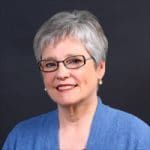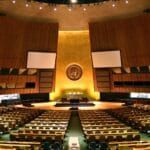Democracy and the bomb
By Kennette Benedict | November 15, 2012
In a democracy, there is no greater responsibility than voting for our government representatives. Whether choosing a state legislator, mayor, congressional representative, or president, selecting among candidates and sending them off to formulate and enact laws on our behalf is the single most important duty of a citizen. And many of us Americans exercised that right in last Tuesday’s national elections. Many also canvassed communities, talked to neighbors, called strangers, got out the vote, and volunteered at polls on Election Day. Yet it is after all the votes are in and the candidates have either claimed victory or conceded that the real work of democracy begins. Or at least it should.
Too often, however, many of us lucky enough to live in democracies view elections as the only responsibility we have as citizens and leave the policy discussions to the elected and to the experts. There are some good reasons for this, of course. People are busy making a living, finding a job, paying bills, sorting out finances, going to school plays, helping out at the local library, going to church, and caring for children and parents. And, if these were not enough in the way of obstacles, some issues — like climate change and nuclear security — seem complicated, contentious, and far removed from our daily lives. Political leaders and policy experts don’t always encourage a lot of participation, either; perhaps they believe that citizens are badly informed about issues and that their participation will result in poor decisions. So, the pressures on time and attention, along with the complexity of the issues and lack of encouragement, lead most people to accept the role that policy elites have assigned them — the ignorant, uninterested public.
Allowing policy leaders and officials to make decisions for us, however, is at odds with the principle of equality, as Robert Dahl notes in his often overlooked essay “Controlling Nuclear Weapons: Democracy versus Guardianship.” While equality allows for a delegation of authority, it also insists that citizens are both qualified to judge which questions require delegation and capable of recapturing that delegated authority when they choose. The principle of guardianship, on the other hand, holds that only a small minority of citizens is sufficiently qualified and therefore capable of making binding decisions for the nation. As Dahl observes, the political system of a modern democratic country is usually a combination of democracy and meritocracy, but, when it comes to nuclear weapons, “We have in fact turned over to a small group of people decisions of incalculable importance to ourselves and mankind, and it is very far from clear how, if at all, we could recapture a control that in fact we have never had.” We are living in a democracy based on guardianship, not equality, when it comes to nuclear weapons.
Now some may argue that it is impossible to expect a majority of citizens to understand the complexity of nuclear strategy, let alone make timely decisions about using nuclear weapons at a moment of high tension and potential aggression against their country. So it follows that only those with special knowledge of weapons capability and strategic thinking should have the power to make policy for all of us in the interests of national security. But if that is the case, then this special class of people is being given sole responsibility for deciding whether or not to kill millions and destroy vast areas of the planet by firing nuclear weapons — without any participation by the people who paid for the weapons with their taxes or by those who voted for the leaders who give the final orders. This is not delegation of authority. As Dahl puts it, this is alienation from authority. Once citizens no longer feel qualified to participate in decisions about their very survival, the connection between the governing and the governed is severed. It is hard to see where the democracy is in this.
Sadly, the principle of guardianship was in full display this election season. None of the presidential debates talked about nuclear security, let alone raised the central issue about nuclear weapons — that is, whether the people of the United States and Russia will continue to subject themselves and the world to the possibility of mass destruction from huge nuclear arsenals used either by accident, madness, or miscalculation. While Iran’s potential nuclear capability occupies the public debate, the fundamental issue — whether policies about the use of existing US nuclear weapons should remain in the hands of the guardians of the arsenal or whether citizens and their representatives should have a say in those policies — was never raised. Instead, we were treated to coverage of the horse race, where voting seems to come down to a bet on the winner, or buying a brand, or liking a Facebook page. The opportunity for citizens to be informed by the campaigns, to learn about complex issues of international security, and to participate in democratic decision making about nuclear weapons was lost. Again.
So, the election is over, and it is time for the president and all Americans to get to work. We are fortunate to have in a reelected President Barack Obama a leader who is knowledgeable about nuclear security issues, willing to explain even the most nuanced policies, and sometimes even willing to listen to those beyond the inner circle. To free the world from nuclear danger, citizens in the United States and Russia, in particular, should claim their rightful places in the nuclear discussion, reignite their democracies, and work with each other and with President Obama and President Vladimir Putin to once and for all get rid of nuclear weapons — before they get rid of us.
Together, we make the world safer.
The Bulletin elevates expert voices above the noise. But as an independent nonprofit organization, our operations depend on the support of readers like you. Help us continue to deliver quality journalism that holds leaders accountable. Your support of our work at any level is important. In return, we promise our coverage will be understandable, influential, vigilant, solution-oriented, and fair-minded. Together we can make a difference.
Topics: Columnists, Nuclear Weapons















